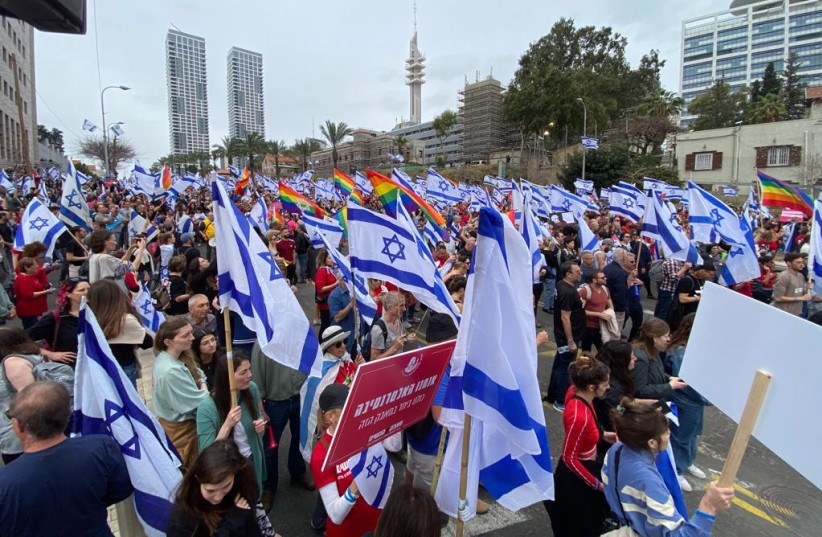During a visit to communities in the North, President Isaac Herzog spoke out for the residents who have been forgotten by the Government, calling upon it to assist them. Giving voice to those who are not being heard and calling public attention to issues that have been swept under the rug are examples of how Herzog goes about doing his job, which is mainly informal: that is, such tasks are not defined as part of the president’s constitutional duties. In effect, the president has precious little authority anchored in law; most of his official actions are ceremonial and only a few are substantive, meaning that they require a certain amount of thought and discretion.
The recently-published Israeli Democracy Index 2023, produced by the Viterbi Family Center for Public Opinion and Policy Research at the Israel Democracy Institute, found an increase in public trust in the president since the start of the war in Gaza. In 2022, his confidence rating was 58%. In June 2023, before the war and at the height of the judicial overhaul debate, it fell to 54%, likely reflecting the role Herzog played in the debate.
After the war broke out, his approval rating rebounded and reached 61%. The Index also had an unexpected finding relating to Israeli Arabs’ trust in the president, which is generally quite low. In June 2023, only 18% trusted him; after October 7 the figure more than doubled, rising to 38%. Over the years, the presidency has generally been the national institution that enjoys the greatest confidence among Jewish citizens, after the IDF, certainly much higher than the elected national institutions (the Knesset and Government).
The public’s trust in the president may shed light on his role in times of crisis. During the judicial overhaul controversy, he could not stand silent in the face of disagreement about the country’s core democratic identity, and he attempted to act as an arbitrator, broker, or mediator. Because of the politicization and polarization involved, he had to navigate cautiously between the two sides.
“The People’s Plan” he published, in which he tried to find a middle ground between the various proposals, was rejected by the coalition parties. This may have resulted in the decline in public trust in the president, especially on the Right, where the downward trend already existed during Herzog’s predecessor, Reuven Rivlin.

In Rivlin’s case, the criticism by his own political home, the Israeli Right, focused on his promotion of issues of importance to the Arab minority, opposition to some clauses of the Nation-State Law, and a call for a new order in the relations among the four “tribes” of Israeli society.
Why the president's confidence rating has risen
WITH THIS in mind, we must ask: what has produced the rise in the president’s confidence rating? One explanation is the public’s yearning for nonpartisanship in a time of crisis – the desire for a symbol of the common existential and ethical denominator of all Israeli citizens, transcending daily politics.
Another explanation is that the president “came down to the people,” in gestures such as touring the destroyed communities of the Gaza periphery, visiting soldiers at the front, and even signing artillery shells. Another issue in which he intervened might seem trivial: the text of the Israeli song for the Eurovision – an action met with criticism by some but which nevertheless echoed public sentiment about Israel’s appearance in an important European cultural event.
The inevitable tightwire act of the presidency, whether performing his ceremonial function or speaking up about current issues, is a major challenge for those who hold this office. The importance of his independent role can be seen in what has happened to the Israel Prize due to politicians’ involvement in selecting those honored. (In recent years, scandals occurred in which education ministers, whose ministry oversees the prize, blocked winners and nominees for political reasons).
To ensure that this high honor can represent the country as a whole, rather than be a subject of political controversy, we should consider transferring the Israel Prize from the Education Minister to a prize committee overseen by the president. In fact, this week a bill to this effect was discussed by the Ministerial Committee for Legislation.
The Democracy Index shows that public trust in the IDF remains high and that confidence in the president has increased since the start of the war – this indicates the extent to which Israeli public opinion is stable; even in the face of unprecedented traumatic events such as October 7 and the war that has ensued, there is little change.
A look at the data also shows just how strong is the desire of Israeli Jews, and to some extent of their fellow Arab citizens, to place the country above all partisan, ideological, sectoral, and tribal considerations – they yearn for words and deeds that express the public interest and the values we all share.
The writer is a research fellow at the Israel Democracy Institute. She is currently working on a study of the presidency in Israel.
